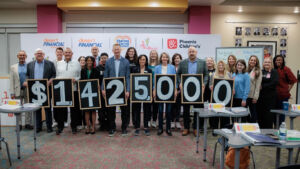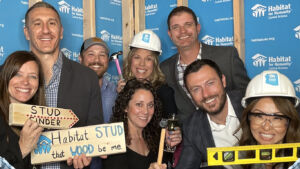Losing your hearing is a whole new world, one where it isn’t easy to know where to start, but thankfully there are those who are there to help.
“Hearing loss doesn’t come with a manual,” says Sherri Collins.
Collins is the executive director of the Arizona Commission of the Deaf and Hard of Hearing (ACDHH), which hosts outreach programs and assistance in the deaf, deaf-blind, hard of hearing and mute community. Collins is also deaf and understands first-hand the need for an agency like this.
“The main thing that we are here for is system change, policy change, to remove barriers. That’s what we do every day,” Collins said. “We don’t provide counseling services. We connect people to appropriate services.”
The ACDHH is celebrating 40 years of providing services and outreach programs to the deaf, deaf-blind, hard of hearing and mute community in Arizona this year.
Collins, along with many others, knows what it is like to live without the ability to hear.
“We (the deaf community) don’t use the terms hearing impaired or deaf-mute or disabled, we don’t like using those terms,” Collins said.
The deaf community prefers the blunt term, deaf, deaf-blind and mute, she said. The community has its own language, its own history and its own way of going about things, Collins explained.
Collins mentioned the different ways she goes about her day. From locking the car doors, the second she gets inside, because she can’t hear someone coming up to her vehicle, or feeling the wall to make sure she remembered to turn off the garbage disposal.
“I have to retrain my brain when I’m doing something. I’m always checking. Everyday I’m checking, before I go to bed,” Collins said. “When I get home the first thing I do is take (my hearing aids) off. That’s the first thing I do. Because it’s just a lot to take in. I like to be in silence. It’s very relaxing to be in the quiet.”
The Arizona Commission of the Deaf and Hard of Hearing provides services and information to the public and those directly affected by hearing loss in order to improve the quality of life for those with hearing loss.
TheACDHH’s facility is home to a library full of books and DVDs explaining how to communicate and deal with people who are deaf. There are resources for everyone, including books for new parents of deaf children and how to best communicate to their children.
“We are the link resource, we link them to the resources they need,” Collins said.
Although ACDHH does not offer any counseling services, they are able to help find a counselor that would best fit the needs of a client.
ACDHH is partnered with the Arizona Relay Services to help the clients receive the proper and most beneficial equipment for their lifestyle as well.
“There are so many technologies and resources that [for] a person who gets hearing loss, it isn’t the end. You can fulfill your life even with hearing loss,” Collins said. “People feel like their lives are over, ‘I can’t do this anymore.’ Absolutely, that is not true. You can do just about anything, so we try to remove that stigma.”
Through the partnership with Arizona Relay Services, the ACDHH helps those in need get text telephone (TTY) systems and video to video relay services installed.
“The relay services allow people who are deaf or hard of hearing to communicate through the phone,” said Ken Arcia, outreach manager forArizona Relay Services. “That’s our goal. To make sure we facilitate to anybody who is deaf or hard of hearing.”
ACDHH has also had an avid role in the state laws surrounding the deaf community.
“We passed that law that says (hearing aid retailers) have to explain (T-switch) during the bill of sales. So, if they are going to sell a hearing aid they have to sign this form that says I have informed this individual about the benefits of using the Telephone Switch,” Collins said. The law was passed back in 2005.
A T-switch or looped technology enables the hearing aid to turn on the second someone with the hearing aid walks into a location. It enhances the hearing and allows the hard of hearing to hear almost as normal.
The agencies’ outreach program doesn’t stop at the deaf and hard of hearing community. The ACDHH teaches public safety officials, healthcare professionals and cities on how to properly communicate with those who are deaf, or hard of hearing.
Evidence that may be gathered by a police officer when there isn’t a qualified licensed interpreter present may be inadmissible in court, because the officer didn’t communicate properly with the deaf citizen, says Carmen Green, deputy director with ACDHH.
Also, for many folks who are deaf or hard of hearing, it’s impossible for them to communicate with 911 dispatchers over the phone unless there are proper services in place. As of now, Lake Havasu is the only city in Arizona that has text to 911 which grants those without their hearing the ability to speak directly to a 911 dispatcher, Green said.
And if an interpreter isn’t present during a medical check-up, a misdiagnosis could be given, or instructions for medication could be misunderstood, Green says.
“There are so many aspects of the communication that make a difference in whatever the service delivery is, whether that be your healthcare or whether it is law enforcement that not having the correct communication makes all the difference,” Green said.



